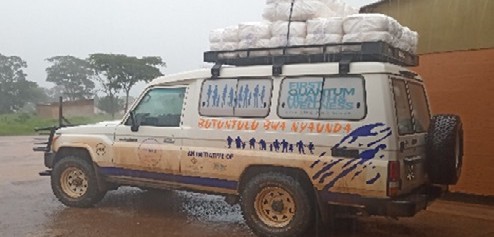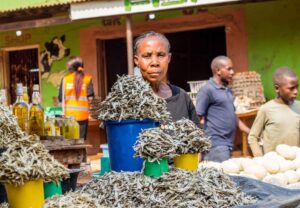COMMUNITY HEALTH
Community health is supported through the First Quantum Minerals Limited (FQML), Health and Wellness department- public health unit. The main goal of the community Health programs is to prevent diseases, promote good health, conduct disease surveillance, prevent outbreaks and provide primary healthcare. Staying healthy is an important part of everyone’s life and determines how productive a person can be and how much they can participate in daily activities. For this reason, FQML takes keen interest in ensuring that employees, dependents and members of the communities surrounding their operations are healthy at all times. The programs in the community are done through Support to the Government, Ministry of Health under an initiative called Butuntulu Bwa Nyaunda(BBN).
Community Water Reticulation Systems
- Malaria Program
- Child Empowerment Adolescent School Program (CEASP)
- Health Systems Strengthening (HSS)
- HIV/AIDs/STIs/TB
- Water, Sanitation and Hygiene Education (WASHE)
- Non Communicable Diseases Reduction
- Epidemic Preparedness and Control (EPC)
BUTUNTULU BWA NYAUNDA (BBN) PROGRAMME
The goal of the BBN is to strengthen the already existing health structures at all levels from the provincial Health Office to community level structures, thereby improving the health status of people in the Communities.
OBJECTIVE 1: To improve health seeking behavior and community involvement in health matters through health promotion services.
OBJECTIVE 2: To Improve child immunization coverages in supported clinics /catchment areas.
OBJECTIVE 3: To contribute towards the reduction in NCDs and Communicable diseases in supported catchment areas.
OBJECTIVE 4: To Contribute towards the reduction in Maternal mortality in supported catchment facilities/areas
OBJECTIVE 5: To improve quality of service delivery through infrastructure improvement and equipping of supported health facilities.

Child Health and Nutrition Activities
Child health and nutrition activities are conducted in order to improve the nutrition status of children under the age of 5 years, through growth monitoring and promotion, immunization, and provision of food supplements.
Clinical and Screening Services
The clinical and screening was conducted in order to make early diagnosis and treatment/management. The team conducted routine screening services through OPD by screening and treating common diseases such as Malaria, HIV/AIDs, Syphilis, Diarrhea, Cancer, URTI etc.
Maternal Health: In order to improve maternal health services in the supported facilities, a number of activities were undertaken such as Antenatal Care services, Postnatal Care services, ultra sound services and participation in national events which included safe motherhood week and world breastfeeding week.
Equipment and Infrastructure Support to Health Facilities
Support to BBN health facilities through donation of medical equipment, data collection Tools, and furniture, among them Blood Pressure Machines, Fetal Doppler’s, Timers, Stethoscopes, Pulse Oximeters, Neonatal Weighing Scales, Pill Counter Trays, Standiometer/Weighing Scale-3-in-1, Infant Length Measuring Boards, Seca-Scales, Standiometers, Infrared Thermometers, Benches, Shelves, Drawers, Chairs and Tables
MALARIA
The goal of the Malaria program is to eliminate local malaria transmission by the year 2025 in line with the National Malaria Strategic Plan. To achieve, the following activities were undertaken in relation to the program objectives.
OBJECTIVE 1: To increase awareness and knowledge of the employees & Community members on malaria prevention and control to improve uptake and correct use of Malaria interventions.
Health Promotion: In the year under review, Malaria health pro- motion related activities were undertaken with various stakeholders such as traditional leaders, NHCs, staff from Provincial Health
Office (PHO), District Health Office (DHO), as well as health facility staff. The team also participated in the commemoration of the World Malaria day in Kalumbila district. Other health promotion related activities included sensitizations regarding Social and Behavior Change Communication (SBCC) for mobile, migrant populations as well as mine employees through various forums such as public announcements, radio programs as well as distribution of IEC Materials. The table below shows the numbers reached in terms of health promotion.
OBJECTIVE 2: To reduce Malaria incidences at FQM and supported facilities
Case Management: Case management is cardinal in ensuring that all Malaria confirmed cases are managed according to standardized Ministry of Health (MOH) and World Health Organisation
(WHO) guidelines in order contribute to the reduction of incidences of Malaria. In light of this, 51 staff were trained in Malaria Case Management.
Transportation and Distribution of Insecticide Treated Nets to Health Facilities
FQM health and wellness collaborated with the Kalumbila District Health Office in the transportation and distribution of 114 bales of insecticide treated nets to supported health facilities targeting the population of under five children and antenatal women.
Maternal Health: In order to improve maternal health services in the supported facilities, a number of activities were undertaken such as Antenatal Care services, Postnatal Care services, ultra sound services and participation in national events which included safe motherhood week and world breastfeeding week.
Equipment and Infrastructure Support to Health Facilities
Support to BBN health facilities through donation of medical equipment, data collection Tools, and furniture, among them Blood Pressure Machines, Fetal Doppler’s, Timers, Stethoscopes, Pulse Oximeters, Neonatal Weighing Scales, Pill Counter Trays, Standiometer/Weighing Scale-3-in-1, Infant Length Measuring Boards, Seca-Scales, Standiometers, Infrared Thermometers, Benches, Shelves, Drawers, Chairs and Tables
MALARIA
The goal of the Malaria program is to eliminate local malaria transmission by the year 2025 in line with the National Malaria Strategic Plan. To achieve, the following activities were undertaken in relation to the program objectives.
OBJECTIVE 1: To increase awareness and knowledge of the employees & Community members on malaria prevention and control to improve uptake and correct use of Malaria interventions.
Health Promotion: In the year under review, Malaria health pro- motion related activities were undertaken with various stakeholders such as traditional leaders, NHCs, staff from Provincial Health
Office (PHO), District Health Office (DHO), as well as health facility staff. The team also participated in the commemoration of the World Malaria day in Kalumbila district. Other health promotion related activities included sensitizations regarding Social and Behavior Change Communication (SBCC) for mobile, migrant populations as well as mine employees through various forums such as public announcements, radio programs as well as distribution of IEC Materials. The table below shows the numbers reached in terms of health promotion.
OBJECTIVE 2: To reduce Malaria incidences at FQM and supported facilities
Case Management: Case management is cardinal in ensuring that all Malaria confirmed cases are managed according to standardized Ministry of Health (MOH) and World Health Organisation
(WHO) guidelines in order contribute to the reduction of incidences of Malaria. In light of this, 51 staff were trained in Malaria Case Management.
Transportation and Distribution of Insecticide Treated Nets to Health Facilities
FQM health and wellness collaborated with the Kalumbila District Health Office in the transportation and distribution of 114 bales of insecticide treated nets to supported health facilities targeting the population of under five children and antenatal women.



